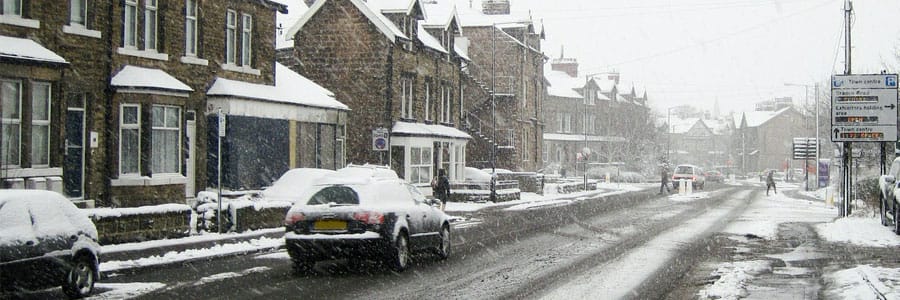Are you ready for winter?

It may not have happened too often yet, but we bet you've encountered an icy car at least one morning in the last month or so. The frosty mornings are beginning to make their presence known so it's more important than ever to make sure you're prepared for driving in less than perfect conditions.
Over a quarter of us spend between one and two hours driving every day, made more difficult at the moment by the lack of daylight and worsening weather conditions. Even with lockdown driving and home-working statistics through the roof, there's still enough traffic around to be impacted by poor weather. So it's crucial you are ready for the plummeting temperatures and short winter days in order to minimise risks.
Hopefully we'll get through this winter without another Beast from the East or some other equally endearingly-named arctic chill that brings chaos to the roads. The fact we don't regularly have to cope with severe winter conditions means when those cold snaps do strike we aren't always prepared for them.
We can't do much about the weather but we can make sure we don't make matters worse for ourselves. Which inevitably brings us on to the annual reminder to be prepared and be safe…because it's amazing how many of us quickly forget the lessons learned the previous year.
So, here's how to be prepared for winter driving
1. If your car is frosted over make sure you completely de-ice your windows, lights and mirrors before setting off. Trying to drive while peering through the tiny square you could be bothered to clear isn't just ridiculous, it's illegal. And highly dangerous. Just as importantly, give yourself time to do this in the morning.
2. Boiling the kettle is not the way to clear your windows of ice. As tempting as it may be to go for the quick fix it won't seem like such a good idea if your windscreen cracks. If you're a little bit lazy when it comes to scraping then invest in a windscreen cover, or just grab an old blanket to throw over the car at night.
3. Carry a winter car kit. It might seem a bit extreme given that our winters are generally milder than most of Europe, but simple things such as a torch, a blanket, ice-scraper, warm clothes and de-icer are usually lying around the car anyway and don't take up much room. The ability to keep your phone charged in case of emergency is always a good idea: it's bad enough if you get stuck; not being able to call for assistance is far worse.
4. Check your tyre pressures and tread depth to make sure they meet the minimum legal requirement. In the winter it's advisable to check your tyre pressures every two weeks. In slippery conditions it's the rubber bits that are going to keep you on the road so make sure they're up to the job.
5. Bad weather can bring unexpected delays with it so make sure you have enough fuel or electric range to get you to your destination. If you get stuck in traffic or hemmed in by freak weather it's much better to have a full tank or plenty of charge so you can keep yourself warm while waiting for the delay to clear.
6. Stopping distances are increased by up to 10 times in poor conditions, so hang back a bit more than usual to give yourself time to react and stop. Your reaction time may not change but bad weather can make it more difficult to spot hazards giving you less time to avoid them. Regardless of your reaction time that still won't alter the fact that it takes longer to bring your car to a stop safely in wet or slippery conditions.
7. If road conditions are icy or snowy and you're approaching a hill, drop well back and try to wait until it's clear of traffic so you won't have to stop part way up. It's a lot easier to reach the top safely if you can keep a constant speed rather than constantly changing gear or having to stop and then try a hill start on a ski slope.
8. Unless you were raised by an Audi Quattro in the wilds of Scandinavia, you're probably not a rally driver. If you lose grip on a slippery surface you won't suddenly become one either. If you do lose traction avoid stabbing frantically at the pedals and steer into the slide gently. Braking or steering too sharply will just cause you to slide even more.
Apologies if you actually are a rally driver. Obviously you already know that last bit much better than we do.
Above all - keep calm, don't rush and stay safe.
View our latest blog posts

Categories
Pages
We are a family run business based in rural Worcestershire. Our team of 38 staff are on hand to provide an exceptional service to personal and business customers.
Read More
